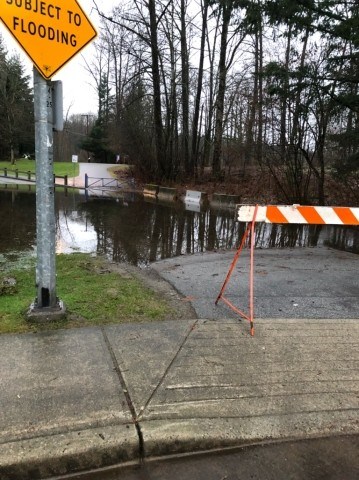Heavy rains that shut down trails, closed a city parking lot and caused property damage to at least two homes last fall has created a sense of urgency in Port Coquitlam about its flood response.
On Tuesday (March 5), city council approved nearly $1.5 million to fast-track projects needed to improve flood protection.
"I'm really pleased that when we go through something like what we have, we take time to reflect upon the experience to learn from it, and to be better prepared for the next one. It seems obvious, but I think that it's something that you have to be very deliberate in doing," said Mayor Brad West, who was recently appointed to Metro Vancouver’s new flood resiliency task force.
The body was recently created in response to the extreme rainfall and flooding last November and complements work being done by the Fraser Basin Council to develop a Lower Mainland flood management strategy.
As well, he pointed out that there were "significant upgrades" to city dikes in 2007, as well as a number of improvements since then.
But while Port Coquitlam's mayor expressed confidence in city efforts to deal with high water flows during extreme weather events, including a report that catalogued city efforts to date, it was acknowledged that more must be done to ensure the city is protected from flooding.
Two points of concern were raised by city councillors: the need to increase dikes to handle one-in-500-year flooding events, from the current one-in-200, and to make sure water doesn't top dikes when the Coqutlam River runs high.
"Are we ready for the one in 200? Never mind the one in 500," asked Coun. Glen Pollock.
"So that leads to my next question. How much higher do we have to go? And what has to be done?"
Council was told analysis needs to be done to determine the height of the dike to meet river forecasts as well as the effects of sea level rise and climate change.
Nevertheless, there may be short-term fixes done to prevent the dikes from overflowing now.
Recently, the City of Coquitlam completed a study to review the one-in-200-year event and predicted potential over-topping and flooding that could require the evacuation of its residents as well as those in Port Coquitlam.
To prevent that from happening, the cities are working with BC Hydro on next steps, which could include an updated study to identify vulnerable areas and the potential for additional buffering.
Coun. Nancy McCurrach pointed out, during last November's heavy rains, water poured over the dike flooding a path under the Coquitlam River Bridge.
"That seems to come on pretty quickly," she said.
Infrastructure planning manager Melony Burton agreed that is one of the problem areas that talks with BC Hydro are seeking to address.
The river could either be dredged, the dike height increased or BC Hydro could reduce water flow in the interim, Burton explained.
"It's not an easy solution, unfortunately, but we will look to find one because that definitely is a concern," she said.
Coun. Steve Darling asked why the parking lot at Gates Park always floods and why hasn't something been done about it.
"Can somebody explain to me why we keep flooding that road and how we fix it because it sounds to me like it's there could be a fairly easy fix here."
He was told that staff are in the process of obtaining quotes from three potential contractors with recommendations to come forward in the next 16 months.
And with climate change causing more frequent heavy rain events, the city needs to be prepared, noted Coun. Laura Dupont.
"The challenges that are coming flooding wise, you talk about rising sea levels and extreme weather events — are both of those things included in in the city's proactive work to raise dikes in the future?" she asked.
Burton assured Dupont that these conditions are included in the city's flood protection plans.
Projects PoCo council agreed to fund in 2022 to fast-track flood mitigation include:
- $1.145 million for design and construction for sanitary system upgrades on Patricia Avenue and the lane east of Wellington Street
- $100,000 to design and upgrade three culverts and assess erosion on Cedar Drive
- $150,000 to design a new Cedar Drainage Pump Station
- $85,000 for design and construction funding to replace of failed drainage main on Fremont Street





